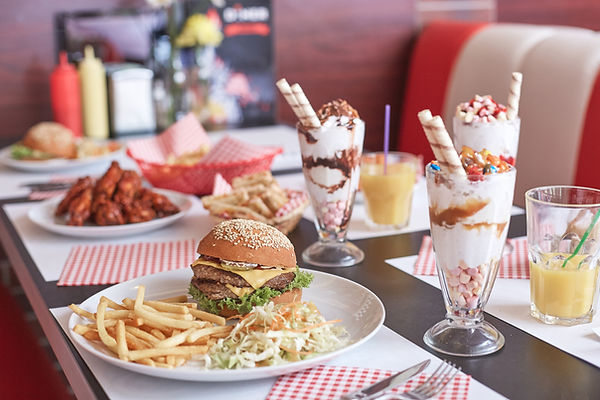The Anti-Diet Culture Dictionary
share to:


Diet culture. Heard of it? Probably not. Live in it? Definitely. Diet culture is the societal obsession with restrictive diets for the purpose of being thin, usually under the guise of a healthy lifestyle. It’s what made your mom cry when her size 8 pants didn’t fit anymore. It’s the reason we spend billions of dollars on diet products. It’s why skinny tea exists. It’s why Kim Kardashian photoshops her booty on instagram.
When we’re so immersed in a culture, it’s hard to see the harm that it does. The first step of recovering from diet culture is awareness. Yep, recovery here refers to everyone, not just those who have eating disorders. By labeling what we experience, we can build awareness, and eventually power over how we interact with our surroundings.
Anti-diet
The revolution fueled by people who have been awakened to the harmful effects of diets. It is not anti-dietER, but rather against the systematically constructed belief of needing to diet to have a better life. We’re against the forces that made you feel like you needed to diet, not you for choosing to diet.

Black and White Thinking
What one often realizes they’re engaging in once they become aware of diet culture.
Body Cues
The signals your body sends to tell you that you’re hungry, full, or somewhere in between. Often skewed in chronic dieters.
Body Trust
The core knowledge that your body is
powerful and has the ability to signal you
what it needs.
Chronic Dieter
One who has been on a diet or diets for so long, they have difficulty returning to their intuitive eater. They are at risk of developing an eating disorder, if they haven’t already. They often require the structure of a meal plan, and the help of a dietitian and therapist to recover from years of body mistrust and influence from others.

Detox
What your liver and kidney(s) do. What teas,
juices, smoothies, etc can’t do.
Diet
A false promise of having a better life if you eat less of something, more of something,or avoid certain foods or food groups. It’s often considered a 4 letter word that refers to your average food intake.

Eat
What you literally have to do every few hours to maintain homeostasis and prevent malnutrition.
Food
Something that you eat. Not good, not bad. Just food.
Food Freedom
The knowledge that you are allowed to eat any food that you want; that all foods are equal; that food doesn’t have morality.
Health At Every Size
From the Health At Every Size website:” Health at Every Size® principles help us advance social justice, create an inclusive and respectful community, and support people of all sizes in finding compassionate ways to take care of themselves.”

Health
An inclusive term that refers to physical, mental, spiritual, and emotional aspects of life. You might set goals to improve health, but it’s not an achievement. It’s an ongoing process of learning, challenging, and changing.
Hunger-fullness Scale
Often on a scale of 1-10 or 1-5, it is useful in communicating your body signals to yourself and your dietitian, as well as building insight into your body cues.
Intuitive Eating
A concept introduced in 1995 by Evelyn Tribole and Elyse Resch. It’s the guidebook that started the revolution. It’s comprised of 10 principles: reject the Diet Mentality, Honor Your Hunger, Make Peace with Food, Challenge the Food Police, Discover the Satisfaction Factor, Feel Your Fullness, Cope With Your Emotions With Kindness, Respect Your Body, Movement- Feel the Difference, and Honor Your Health- Gentle Nutrition. Often misconstrued into a weight loss diet and stolen by diet influencers to lure people back into diet culture. More on Intuitive Eating can be found here.

Kale
Vegetable. Provides fiber, Vitamin A, and Vitamin C. Was once just a decoration on a plate at a restaurant and now has become a food staple in diet culture. It’s just a food!
Lifestyle change
A sneaky way to say diet.
Meal Plan
A tool used to recover from chronic dieting. Ensures consistent nutrition and minimizes decision making. The difference between meal planning on a diet and meal planning in recovery is your intention. A meal plan on a diet is for weight loss where a meal plan used after chronic dieting is about healing your relationship with food. One plans while anxiety is low, so that they can have meals decided when anxiety or dieting thoughts are high.
Mindful Eating
A tool to build awareness of your body’s reactions to food. Involves paying sole attention to the five senses and returning to them when you notice your mind wandering.

Potato
A vegetable. Provides a source of potassium, Vitamin C, and Vitamin B6. Was once a staple meal item, but diet culture has spread a lie that it has no nutritional benefit. It’s just a food!
Recovery
The process of working through guilt, shame, and trauma around food to return to one’s intuitive eater.
Size Inclusive
Building awareness of the different bodies, and celebrating our diversity. Learning about people’s experiences in their body’s and modifying our beliefs and actions in accordance with this new information.
Yourself
Who you return to as you heal from dieting. The reason why you’re choosing to heal your relationship with food. The center of therapy and nutrition counseling sessions. A person who is entirely worthy of acceptance just as they are.

I hope this guide gives you a common language to better support you on your journey. Feel free to share with family and friends who might be perplexed by your way of talking about food. I welcome elaborations on these definitions! How do you define your relationship with food?
What other terms belong in the Anti-Diet Culture Dictionary? Let me know in the comments and I’ll do a part 2!